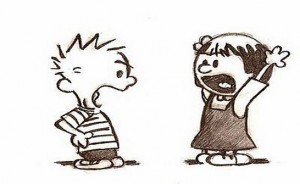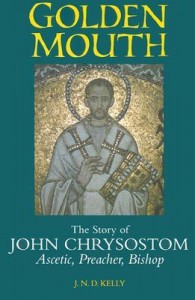 It increasingly takes a GREAT deal for me to voluntarily engage in discussions concerning abortion online. I’m less and less interesting in doing so and usually do not. That is because online abortion discussions rarely remain in the realm of reasonable discussion and quickly lapse into outright hysteria on all sides. However, I was moved to offer a comment over at James Matichuk’s blog, “Thoughts, Prayers & Songs; My Journey from Self-Absorption to Doxology,” in response to a gentlemen named Brian Balke who commented on Matichuk’s review of Christopher Hall’s Living Wisely With the Church Fathers. I hasten to add that Balke was respectful in his comments and did NOT indulge in the type of hysteria I just bemoaned.
It increasingly takes a GREAT deal for me to voluntarily engage in discussions concerning abortion online. I’m less and less interesting in doing so and usually do not. That is because online abortion discussions rarely remain in the realm of reasonable discussion and quickly lapse into outright hysteria on all sides. However, I was moved to offer a comment over at James Matichuk’s blog, “Thoughts, Prayers & Songs; My Journey from Self-Absorption to Doxology,” in response to a gentlemen named Brian Balke who commented on Matichuk’s review of Christopher Hall’s Living Wisely With the Church Fathers. I hasten to add that Balke was respectful in his comments and did NOT indulge in the type of hysteria I just bemoaned.
Matichuk had noted, in commenting on Hall’s book, the consistent patristic opposition to abortion in the early years of the church and Balke responded with a comment that I mention here in part:
The attitude to the fetus is idealistic. Did the early fathers recognize that there are mothers and fathers that are incapable of providing such nurturance, and that in fact the pressure of adding a child to a household might guarantee suffering and death to both mother and child? I am not asking this to be contrary, but simply as a matter of record: did they grapple with the practical issues of pregnancy and birth from a woman’s perspective?
If they didn’t, why do we reference them?
I think I can say with honesty that I was immediately more intrigued by Balke’s premise than by any conversation about abortion per se. I commented thus:
I wanted to offer a few thoughts here, not to be contrary or combative, but rather because I think this is an interesting discussion. And let me say that I appreciate calm and thoughtful discussion on this issue. It is too rare! (Also, thank you for the book review. I have the first two of Hall’s books and will be adding the last two as well.)
Brian, you wrote: “I am not asking this to be contrary, but simply as a matter of record: did they grapple with the practical issues of pregnancy and birth from a woman’s perspective? If they didn’t, why do we reference them?”
That last question is very interesting. I’m curious about the premise undergirding it. Is the premise that views are rendered insignificant and potentially illegitimate if they were formulated within a particular framework in which factors that we realize are significant today were not taken into consideration?
Meaning, that question would seem to undercut the legitimacy of a great many ideas that we consider valid even though they existed in similarly limited cultural contexts.
Let me give an example. How is your question, “If they didn’t [grapple with the practical issues of pregnancy and birth from a woman’s perspective]…why do we reference them?” conceptually different from this question: “If Thomas Jefferson did not grapple with the practical issues of freedom from the perspective of slaves then why do we reference his views on freedom?” Brian, would you grant the analogy? Just curious.
All of that being said, I think we must be very careful with saying that BECAUSE (a) the fathers were largely misogynistic therefore (b) the fathers’ views on abortion gave no consideration at all to women, their experiences, what they thought of abortion, etc. Meaning, granting the pervasive misogyny of the time does not necessarily mean granting that every church father was utterly and completely misogynistic and completely indifferent to the plight or thoughts or feelings of women. The notion that none of these men considered or gave ear to the thoughts and feelings of the women in the Christian communities they oversaw on the issue of pregnancy says more than we can say with any certainty.
Even so, I think you have to go one more step and say this: The truthfulness or falsity of the fathers’ views on abortion does not actually hinge on whether or not they gave consideration to the experiences of women. (We would all agree that the issue should not be discussed without consideration of women, of course, and, to the extent that the fathers did not do so they were mistaken. That such an approach is lamentable and misogynistic does not render their conclusion false per se.) There are LOTS of tensions in human experience and history rarely breaks down into such neat categories.
Over the last few years I have made it a habit when hearing any argument to try to delineate the operational premises behind arguments and claims. My comments above will give an illustration as to why. I think we sometimes grant validity to premises that take us further than we want to go. I wonder if Balke has been guilty of doing that here, for reasons I outlined above.
Let me offer another example of what I mean. Take the question of homosexuality. It is not uncommon to hear people argue, “Well, people are born that way.” Now, that is a statement that makes an argument and the argument hinges on the validity of the unspoken premise. But take a moment and try to articulate the premise behind it. As I see it, the premise would be something like this: “Proclivities with which we are born are not sinful by virtue of the fact that we are born with them.” But I wonder if many who use that premise in arguing that homosexuality is not sinful behavior would be comfortable with the premise itself and all the doors it opens. Meaning, what do we do with people who claim that as far back as they can remember they have felt strong desires to do a number of things that society at large would condemn as morally wrong. I probably do not need to list all of the things that those might be because we all hear these kinds of arguments all the time. So, again, I ask: is it not wise to ask whether a premise we are employing for a particular argument might not be opening doors we do not want opened in other areas where the premise can be similarly applied?

